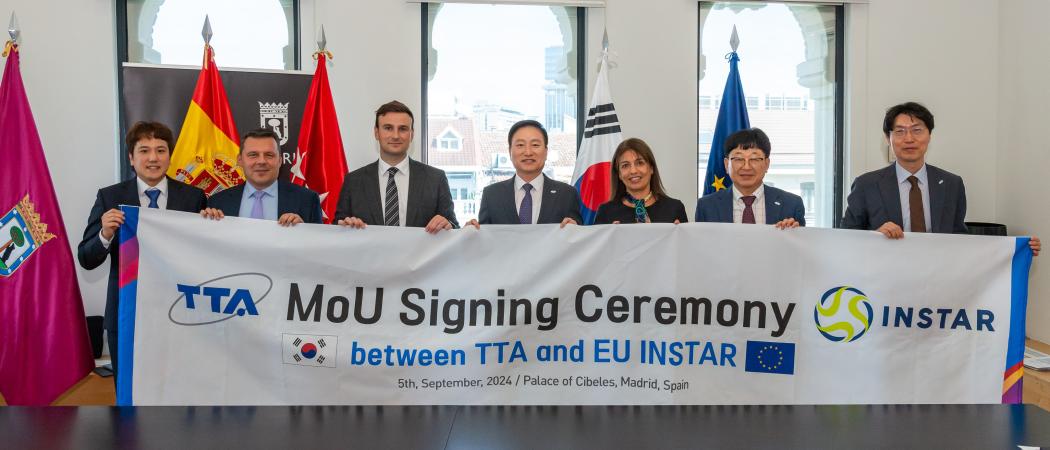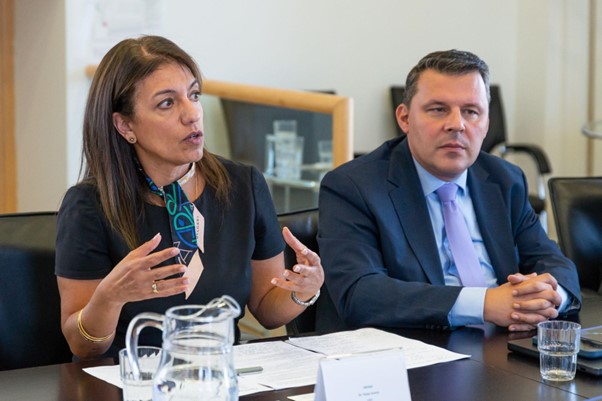The INSTAR project, which is supported by the European Commission, and the Telecommunications Technology Association of the Republic of Korea are establishing an international task force on digital standardisation priorities, a first strategic step to strengthen the EU-Republic of Korea Digital Partnership.

Photo credits: BluSpecs
The EU-funded INSTAR project has signed a Memorandum of Understanding with the Republic of Korea – its first with an international partner. Established in October 2023 to promote EU values in international ICT standardisation, INSTAR is a consortium of 10 industrial and research partners coordinated by BluSpecs. The other partners are Fortiss, AIOTI, Fraunhofer, Trialog, TU Delft, Trust-IT Services, COMMpla, Austrian Institute of Technology, National Centre for Scientific Research Demokritos.
By the end of this year, the collaboration plans to establish a joint EU-Republic of Korea international task force (ITF). The MoU defines several goals for the ITF with the Republic of Korea, including the identification of standardisation priorities on both sides across 5G/6G, artificial intelligence (AI), cybersecurity/digital ID, data technologies, Internet of Things (IoT), and quantum technologies, and the development of a joint standardisation roadmap for these priorities to be promoted to international standards development organisations (SDOs) to become work items.
The two parties regard the new MoU as a critical step toward alignment of European and Republic of Korea standardisation priorities, making this partnership timely and essential.
The EU and the Republic of Korea both have leading capabilities in the field of semiconductors. Since 2023, the EU and the Republic of Korea have committed to cooperate on emerging technologies as put forward in the EU economic security strategy. Under the framework of the EU and Republic of Korea Digital Partnership, they decided to advance cooperation on semiconductors, high performance computing (HPC) and quantum technology, 5G and beyond, platform economy, artificial intelligence (AI) and cybersecurity.
INSTAR aims to shape the future of international ICT standardisation by promoting EU values and interests in key emerging technologies (AI, cybersecurity, digital ID, quantum, IoT, 5G, 6G and data) by collaborating with relevant entities from Australia, Canada, Japan, Singapore, Taiwan, the USA and the Republic of Korea. It does so by establishing a number of European and International Task Forces of standardisation experts, integrating technical and industry expertise, dedicated to facilitating robust knowledge exchange and influencing the development of international standards in line with EU policies. INSTAR’s mandate will continue until June 2026.
A joint roadmap on standardisation priorities
INSTAR international task forces are geared towards establishing communication channels with relevant entities and the development and implementation of high-level standard framework roadmaps for each technology domain, which are crucial for aligning international standardisation efforts with European strategies and policies and fostering a unified vision and actionable steps across different technology domains.

Picture: Tanya Suarez, INSTAR coordinator from BluSpecs, and Damir Filipovic, AIOTI. Photo credits: BluSpecs
Hosted by the Ayuntamiento de Madrid, the MoU signing event was attended by Tanya Suarez, INSTAR coordinator from BluSpecs, Damir Filipovic, AIOTI, the Alliance for IoT and Edge Computing Innovation and INSTAR leader for the International Task Forces activities, and Antonio Kung, Trialog, along with Mr. Seung-hyun Son, President of TTA, the Telecommunications Technology Association of the Republic of Korea.
“This MoU will strengthen the EU-ROK Digital Partnership by supporting its implementation in key areas of standardisation, including 5G/6G, AI, and cybersecurity,” says Tanya Suarez. “It aims to deliver tangible outcomes in international standardisation bodies through working items proposed or supported by both European and Republic of Korea representatives.”
The INSTAR-TTA collaboration is designed to give stakeholders on both sides the opportunity to shape the EU-ROK standardisation priorities and ensure that they are acknowledged by international SDOs.
By promoting European standardisation priorities, this collaboration ultimately strengthens and reinforces the partnership between the EU and the Republic of Korea, positioning both regions as global leaders in technological standardisation and regulatory alignment.
“This collaboration will ensure that the priorities identified by the INSTAR European Task Forces are visible within international standardisation organisations,” concludes Damir Filipovic, AIOTI, INSTAR ITFs activities leader.





 A unique international forum for public research organisations and companies to connect their external engagement with strategic interests around their R&D system.
A unique international forum for public research organisations and companies to connect their external engagement with strategic interests around their R&D system.